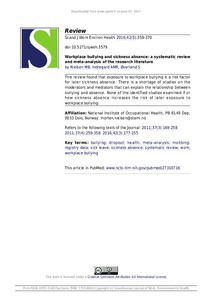Workplace bullying and sickness absence: a systematic review and meta-analysis of the research literature

Nielsen, Morten B. ; Indregard, Anne-Marthe R. ; Øverland, Simon
Scandinavian Journal of Work, Environment and Health
2016
42
5
359-370
bullying at work ; data analysis ; sick leave
Psychosocial risks
http://dx.doi.org/10.5271/sjweh.3579
English
Bibliogr.
"Objective
The association between workplace bullying and sickness absence remains unclear. This paper presents a systematic review and meta-analysis of research on the association.
Method
We conducted a systematic review and meta-analysis of published primary studies on workplace bullying and sickness absence. Studies based on prospective design or registry data on sickness absence were included. Cross-sectional studies with self-reported sickness absence were excluded.
Results
Seventeen primary studies were included in the review, sixteen originated from the Nordic countries and fifteen included registry data on sickness absence. All but one study found that exposure to workplace bullying was associated with increased risk of sickness absence. A meta-analysis of ten independent studies showed that exposure to bullying increased the risk of sickness absence (odds ratio 1.58, 95% CI 1.39–1.79). Five studies included variables that moderated the association between bullying and absenteeism. None of the studies included mediating variables. No studies examined sickness absence as a risk factor for later exposure to bullying. Following the GRADE guidelines, the evidence for an association between bullying and sickness absence is moderate.
Conclusions
Workplace bullying is a risk factor for sickness absence, but the mechanisms to explain this relationship are not sufficiently described. It is unclear whether sickness absence predicts later exposure to bullying. While, the methodological quality of the reviewed studies was high, the knowledge base is small. There is a need for more research on how and when bullying is related to sickness absence and the possible bidirectional relationships involved."
Digital
The ETUI is co-funded by the European Union. Views and opinions expressed are however those of the author(s) only and do not necessarily reflect those of the European Union or the ETUI.